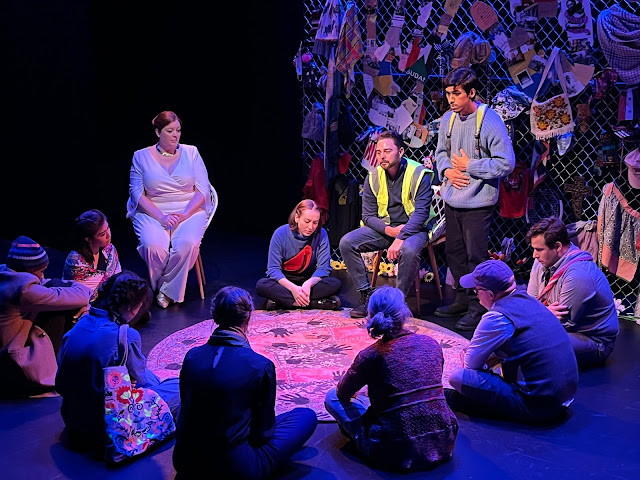The Refugees
Written and directed by Stephen Kaliski
502 W 53 St., Manhattan, NYC
June 4-26, 2022
 |
| Carolina Đỗ, Rachel McPhee, Jonathan Nathaniel Dingle-El. Courtesy Adjusted Realists |
Just as we begin a "very active" hurricane season and another summer predicted to be hotter than normal, with a "severe" wildfire season and continued "severe drought," The Refugees brings an imagined climate-driven refugee crisis to the New York City stage. Written and directed by Stephen Kaliski, who is also an educator and the co-founder of the Adjusted Realists theater company, The Refugees unfolds in a world that is simultaneously our own and that of classical Greek drama. As a modernized House of Atreus struggles internally with how to deal with the refugees who have made their way to an Argos spared by chance from climatic disaster, this movingly clear-sighted show, which is partnered with Women for Afghan Women, a local NYC refugee organization (donations can be made after the show or online), asks us to consider how far and to whom our obligation to help extends. |
| Carolina Đỗ and ensemble. Courtesy Adjusted Realists |
When the play begins, Athenian, Minoan, and Thracian refugees are living in an Argive camp, their own city-states having been thrown into chaos or rendered uninhabitable. In the opening scene, one of the refugees incisively comments that offers of hospitality are often made with the assumption that no follow-through will ever actually be necessary. And indeed, these refugees remain suspended in a liminal statelessness, at but not of Argos. As head of state, Clytemnestra (Rachel McPhee) feels that she has done her duty and exercised compassion by not killing them or driving them away. Her children, the passionate Orestes (Jonathan Nathaniel Dingle-El) and astute Electra (theater artist and community organizer Carolina Đỗ) disagree, advocating, with Orestes' romantic partner Pylades (Matt Mastromatteo) and others of their activist friends, that their mother allow Argos to absorb all of the refugees. The family unit is introduced to us by a nurse (Valerie Clayman Pye) who cares for Electra in her chronic illness and who is lucky enough to have immigrated to Argos but–like many real-world immigrants–not lucky enough to hold a position commensurate with her qualifications or to be respected or even understood by most in her adopted country. When the younger generation receives word via messenger (a drolly funny Robert K. Benson) that Clytemnestra has rejected their proposal, they must either abandon their aims or invent a new way to achieve them.
 |
| Ensemble. Courtesy Adjusted Realists. |
The positions staked out by various characters in relation to the play's central ethical dilemma will be recognizable, perhaps even discomfitingly so, to most in the audience. The Messenger feels that the refugees should express gratitude for their current situation; Pylades, not buying into neoliberal imaginaries of scarcity, argues that they will bring diverse contributions rooted in their native cultures if admitted to Argos. As exemplified in an extended debate between Clytemnestra and Electra, compellingly played by McPhee and Đỗ, the former embodies how globalized neoliberal capitalism tries to limit caring to (often biological, nuclear) family and undermines wider or alternative conceptions of kinship (in the connection to climate issues, the play shows how human interdependence extends to global ecological relations). Electra asserts that being able to help one person but not doing so is morally wrong, an argument much like that of philosopher Peter Singer, who figures in the lobby display, in his
"The Singer Solution to World Poverty"—and one that Clytemnestra turns back on her daughter. The refugees themselves–who in some instances present their case through art, much as the play itself does (song too functions for them at moments as a form of communalism)–leave in one poignant scene small offerings at Clytemnestra's feet as they name what they have lost or need. Even as we recognize the immediacy of many of these elements, the prism of Greek drama adds some useful distance, lending a bit of abstraction productive for thinking about the ethical problems raised by the play while still grounding them in these specific characters. The interweaving of elevated language and poetic repetition with more informal speech, including devised material and some derived, as mentioned in a 22-min pre-show podcast available at
adjustedrealists.com, from recent work in Greece with refugee organizations, effectively recalls contemporary translations of Greek drama, while several compelling moments of audience participation suture spectators into that world.
 |
| Rachel McPhee, Jeremiah Maestas, Josue Zeus Guerrero, and ensemble. Courtesy Adjusted Realists. |
Clytemnestra, in a reflective moment, says that we are "[s]mart enough to grow, / too stupid to sustain." This pithy observation might strike one as all too true, but it also gestures to only one part of the inextricable anger, pleasure, guilt, despair, and hope of trying to live in ethical relation to others and to the planet that this production captures so well and so impactfully. The play, much to its credit, offers no easy resolutions: when Clytemnestra tells Electra that she (Electra) is too weak to kill her, she might be the voice of entrenched systems and interests everywhere; Electra's own seemingly admirable remark that she would raise a refugee child comes to be unsettlingly complicated; and any assumption that things can play out one of two ways proves potently unfounded. As the Care Collective writes, care is not only interpersonal but also social, political, and ecological, and "our caring imaginaries must move away from only caring for one's own, towards the community-building of radical municipalism and nation states, ending with caring for the furthest reaches of our interconnected planet," as part of which "belonging, citizenship, and rights must all be organised around the principle of care rather than by birthplace, identity or national territorial claims" (
The Care Manifesto, Verso, 2020: 69, 68).
The Refugees allows us to imagine such a world even as it points out how far we remain from it.
-John R. Ziegler and Leah Richards







Comments
Post a Comment